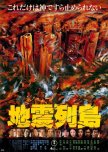At least we'll die together, they way it should be.
Magnitude 7.9 is another little-known Toho disaster film born from the same veins as the likes of Submersion of Japan and Tokyo Gulf Burns. I'm a bigger fan of the US title of the film, Deathquake, although the UK release titled Megaforce 7.9 does get a chuckle out of me, sounding like an extension of the Power Rangers series. Regardless, what Magnitude 7.9 does offer is what I've come to expect from these styles of films, lots of engaging character drama and stunning destruction.
When Seismologist Hoichi predicts that there will be an earthquake in Tokyo of greater magnitude than the one in 1923, which his father predicted, he is ostracised by his co-workers, family and friends; eventually, he starts seeing another woman, who already has a boyfriend. Hoichi's wife wants to meet her before she will grant a divorce but when the earthquake he so predicted strikes, it becomes a true test of both character and will to survive.
This is seemingly the only big-budgeted film from director Kenjirô Ohmori outside of some drama he directed 7 years prior which I doubt anyone has heard of. It's a serviceable effort from the man, capturing what he needs and knowing what to use. There's a great use of lighting, shadows and angles throughout, Kenjirô offers enough that it keeps the viewer invested throughout the first half before taking a 180 and going balls to the wall in the second.
A lot of what makes these films worthwhile is being able to get engaged with all the human drama going on and thankfully due to the efforts of Kaneto Shindō, yes THAT Kaneto Shindō, it's a lovely look at what happens when a person's belief in something is pushed to the max and how it affects the people around them. There's still time to focus on both the higher-ups and the common folk, but not to the same extent that it was explored in the later Tokyo Blackout, however unlike that film which thrust the disaster pretty much from the outset, Magnitude 7.9 takes about 66-minutes to get to it's advertised disaster.
Speaking of the destruction, there is about 20 minutes worth of equally gorgeous and utterly horrifying set pieces courtesy of the king that is Teruyoshi Nakano. While it's not his best work it does bring to life so many situations that would not be the best-case scenario to be caught in, especially that of riding an underground train at the time of the earthquake striking or landing in a 747 as the earthquake tears apart the runway. Of course, there are a couple of reused sequences from the likes of both Submersion of Japan and the banned Prophecies of Nostradamus but even then they are reduced to only a few shots so they don't make themselves that known unless you know to look for them.
While I praised the character work earlier, what Magnitude 7.9 fails to capture is any form of attachment to a lot of our everyday protagonists. The acting isn't bad, again serviceable but you'd be expecting Toho to try and rope in a few more familiar faces than what we got. The likes of both Hiroshi Katsuno and Yoshio Inaba are welcome presences as are Eiji Okada and Toshiyuki Nagashima and all deliver sound performances but nothing that really stands out that much in the grand scheme of this genre. There are a lot of cute father and son moments that really touched my heart with them seemingly reconnecting over the father's ousting and their little embraces really got the tears going at points.
The only other major critique I have is with the music composed by Toshiaki Tsushima. It's not a bad score but the music placement is all over the place, cutting out when there would be music and overwhelming the visuals when there shouldn't be any. It all feels a bit mistimed and mismatched. It's not one I'll desperately seek out to listen to again.
Overall, I'd find it hard to recommend Magnitude 7.9 to someone who wasn't that invested in exploring the realms of Japanese disaster films, it's a perfectly fine movie don't get me wrong, but a lot of the elements in certain areas have been done better by others. It's worth it all for the destruction sequences alone though.
When Seismologist Hoichi predicts that there will be an earthquake in Tokyo of greater magnitude than the one in 1923, which his father predicted, he is ostracised by his co-workers, family and friends; eventually, he starts seeing another woman, who already has a boyfriend. Hoichi's wife wants to meet her before she will grant a divorce but when the earthquake he so predicted strikes, it becomes a true test of both character and will to survive.
This is seemingly the only big-budgeted film from director Kenjirô Ohmori outside of some drama he directed 7 years prior which I doubt anyone has heard of. It's a serviceable effort from the man, capturing what he needs and knowing what to use. There's a great use of lighting, shadows and angles throughout, Kenjirô offers enough that it keeps the viewer invested throughout the first half before taking a 180 and going balls to the wall in the second.
A lot of what makes these films worthwhile is being able to get engaged with all the human drama going on and thankfully due to the efforts of Kaneto Shindō, yes THAT Kaneto Shindō, it's a lovely look at what happens when a person's belief in something is pushed to the max and how it affects the people around them. There's still time to focus on both the higher-ups and the common folk, but not to the same extent that it was explored in the later Tokyo Blackout, however unlike that film which thrust the disaster pretty much from the outset, Magnitude 7.9 takes about 66-minutes to get to it's advertised disaster.
Speaking of the destruction, there is about 20 minutes worth of equally gorgeous and utterly horrifying set pieces courtesy of the king that is Teruyoshi Nakano. While it's not his best work it does bring to life so many situations that would not be the best-case scenario to be caught in, especially that of riding an underground train at the time of the earthquake striking or landing in a 747 as the earthquake tears apart the runway. Of course, there are a couple of reused sequences from the likes of both Submersion of Japan and the banned Prophecies of Nostradamus but even then they are reduced to only a few shots so they don't make themselves that known unless you know to look for them.
While I praised the character work earlier, what Magnitude 7.9 fails to capture is any form of attachment to a lot of our everyday protagonists. The acting isn't bad, again serviceable but you'd be expecting Toho to try and rope in a few more familiar faces than what we got. The likes of both Hiroshi Katsuno and Yoshio Inaba are welcome presences as are Eiji Okada and Toshiyuki Nagashima and all deliver sound performances but nothing that really stands out that much in the grand scheme of this genre. There are a lot of cute father and son moments that really touched my heart with them seemingly reconnecting over the father's ousting and their little embraces really got the tears going at points.
The only other major critique I have is with the music composed by Toshiaki Tsushima. It's not a bad score but the music placement is all over the place, cutting out when there would be music and overwhelming the visuals when there shouldn't be any. It all feels a bit mistimed and mismatched. It's not one I'll desperately seek out to listen to again.
Overall, I'd find it hard to recommend Magnitude 7.9 to someone who wasn't that invested in exploring the realms of Japanese disaster films, it's a perfectly fine movie don't get me wrong, but a lot of the elements in certain areas have been done better by others. It's worth it all for the destruction sequences alone though.
Was this review helpful to you?






